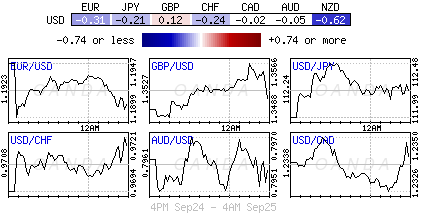Monday September 25: Five things the markets are talking about
Weekend political results dominate Monday’s financial markets.
In Germany Sunday, Angela Merkel won her fourth term as Chancellor, but her Christian Democrats did not do as well as anticipated, while support for the far right AfD party surged. Her CDU party will now have to form a different coalition; most likely with the liberal FDP party and the Greens, after the SPD said it would not form another grand coalition.
Down-under, New Zealand’s general election on Saturday failed to deliver a clear result. Party leaders now have to forge alliances to achieve a ruling coalition, which could result in either another term for the current center-right National Party, or a win for the center-left Labour Party.
Note: On Thursday, Reserve Bank of New Zealand (RBNZ) is expected to leave the official cash rate on hold (+1.75%), to provide continuity given the current election-impasse and with a new RBNZ Governor at the helm.
Elsewhere, among the economic data to be released is August consumer-spending data for Germany and France, while in Japan there is a plethora of data out – consumer prices, household spending and retail sales, unemployment and industrial production – all for August.
Note: PM Abe is expected to dissolve the lower house of parliament at the start of the extraordinary session on Thursday, paving the way for a snap election for the lower house.
Stateside, the market will be focusing on the U.S consumer spending last month, data on Wednesday is expected to post the smallest gain in six-months.
Central bank speakers will also be keeping the market on its toes this week. ECB’s Draghi addresses EU lawmakers in Brussels this morning. Fed Chair Yellen speaks in Cleveland on Tuesday. Bank of Canada (BoC) Governor Poloz appears on Wednesday, while Bank of England (BoE) Governor Carney speaks Thursday, as does soon-to-depart Fed Vice Chair Fischer.
1. Stocks soft start to the week
In Japan, the Nikkei share average rallied overnight (+0.5%) as a weaker yen (¥112.15) again lifted exporters, while expectations of economic stimulus measures after an election next month supported overall sentiment. The broader TOPIX index also advanced +0.5% at the close.
Down-under, Australia’s S&P/ASX 200 Index ended unchanged, while South Korea’s KOSPI index slid -0.4%.
In Hong Kong, the Hang Seng Index fell -1.4%, pressured by Chinese property developers slumping after several cities on the mainland tightened rules on home sales.
In China, a new round of government curbs to rein in the heated housing market hurt stocks. The blue-chip CSI 300 index fell -0.5%, while the Shanghai Composite Index lost -0.3%.
In Europe, regional stocks are drifting higher as the session progresses, but political uncertainty following election results is weighing on sentiment. FTSE in focus after Moody’s cut the country’s risk rating late Friday (see below).
U.S stocks are set to open in the red (-0.1%).
Indices: Stoxx50 +0.1% at 3,546, FTSE -0.2% at 7,298, DAX +0.3% at 12,627, CAC 40 flat at 5,281, IBEX 35 -0.6% at 10,245, FTSE MIB +0.1% at 22,544, SMI +0.2% at 9,158, S&P 500 Futures -0.1%
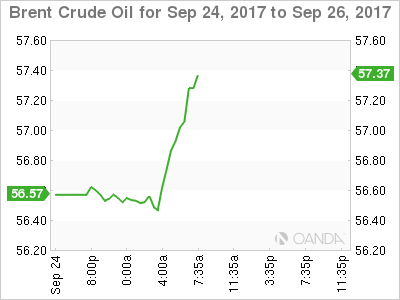
2. Oil steady as market rebalances, gold lower
Oil prices have come under pressure from a stronger dollar, but have managed to retain most of their recent gains, supported by Friday’s OPEC meeting where producers said that they were making progress towards rebalancing.
Brent crude for November delivery is up +1c at +$56.87 a barrel, its highest since March, while U.S light crude (WTI) is down -20c at +$50.46, but not far off its recent four-month highs.
OPEC said Friday that output curbs were helping cut global crude inventories to their five-year average stated target.
Note: Production curbs have faced rising U.S shale oil output, while U.S energy firms have cut the number of oil rigs operating for a third consecutive week as a 14-month drilling recovery stalled.
Ahead of the U.S open, gold prices remain under pressure, trading atop of their one-month lows hit last week, as the U.S dollar finds some support and concerns over the Korean peninsula ease a tad. Spot gold is down -0.4% at +$1,291.60 per ounce. Prices of the yellow metal dropped about -1.7% last week.
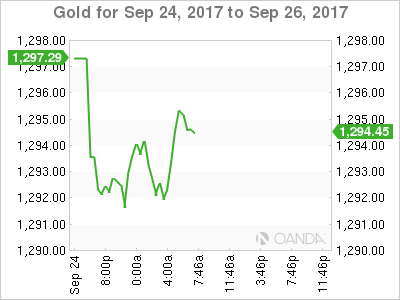
3. Central bank speak to influence yield direction
UK 10-Year Gilt yields are little changed at around +1.365% following the British sovereign’s downgrade at Moody’s late Friday. The rating company cut the U.K’s rating to Aa2 from Aa1, citing a weaker outlook for public finances and “the erosion of the U.K.’s medium-term economic strength that is likely to result from the manner of its departure from the E.U.”
Note: Gilt yields have been surging from levels of around +1% in recent weeks on anticipation that the BoE will raise its policy rate as early as November.
In the Eurozone, periphery government-bond yield spreads are trading slightly wider following the German election. The 10-year Italian BTP-German bund yield spread trades +3 bps wider at +168 basis points, while the Spanish and Portuguese spreads over bunds are both +2 bps at +108 bps and +199 bps.
Elsewhere, the yield on 10-year Treasuries fell less than -1 bps to +2.25%.
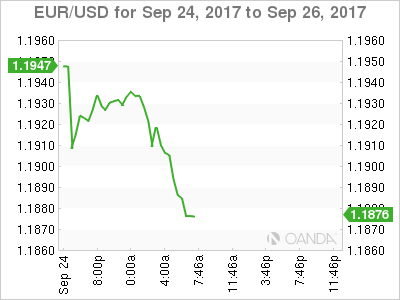
4. Dollar gains some ground
Political results have dominated currency moves in the overnight session. The EUR (€1.1885) is trading down -0.4% after a strong showing by the far-right AfD party, even as Chancellor Merkel looks set to continue in the role. A three-way “Jamaica” coalition of Merkel’s Christian Democrats, the Free Democrats (FDP) and the Green party is expected, but negotiations could take some time.
Sterling has opened up a tad stronger, up +0.2% at £1.3535, as investors correct its weakness from Friday. However, expect gains to be capped after Moody’s downgraded the U.K to Aa2 late last week.
Note: PM May’s speech Friday does not seem to be an issue for the pound thus far – the PM really did not say much, but her tone seems to have definitely changed and is a tad more conciliatory.
The New Zealand dollar trades down -0.6% at NZ$0.7273 outright after an inconclusive election in New Zealand.
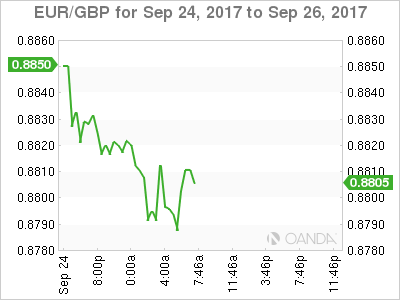
5. German business sentiment slips in September
Data this morning shows that German business sentiment slipped last month, albeit from a high level, as companies lowered their outlook, according to the Ifo Institute’s monthly survey, which was conducted ahead of yesterday’s German general election.
German Ifo business climate index fell to 115.2 points from 115.9 points in August. The market was expecting an unchanged result.
Lacking a majority in parliament, Ms. Merkel will need to build a governing coalition, and many political observers warn that the process could drag on for weeks.
